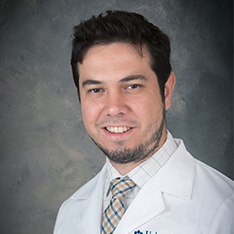Feel confident you are getting high-quality diabetes care at Texas Diabetes Institute in San Antonio because our research influences and affects diabetes care and treatments worldwide.
Recognized Care
The American Diabetes Association recognizes the Texas Diabetes Institute for exceptional treatment of diabetes and crucial diabetes self-management education. Our renowned doctors and faculty work toward understanding and helping eliminate diabetes.
Advances in Diabetes Care Through Research
Our Clinical Research Center has been involved in the early stages of research on new diabetic medications approved by the Food and Drug Administration.
The Research Center is currently participating in multiple national clinical trials designed to develop new treatments for Type 1 and Type 2 diabetes. In some of these clinical trials and research studies, the Texas Diabetes Institute team has been the leader with positive results and ground-breaking findings.
Ralph DeFronzo, MD, recently completed a nationwide trial using pioglitazone and reduced the conversion of prediabetes to diabetes by 72%. The latest trend is to combine newer drugs to address obesity and diabetes with anti-hyperglycemic effects and weight loss. This has been accomplished with the use of Byetta, which the research team has extensively studied.
The research team continues to build on a rich history of accomplishments in diabetes studies. Some of the major successes include:
Achievements
Research & Development of Metformin (Glucophage)
The Clinical Research Center has been involved in the early stages of research on new anti-diabetic medications approved by the FDA for the management of diabetes in the United States and throughout the world. Metformin (Glucophage), the most commonly prescribed drug for the treatment of Type 2 diabetes today was introduced and disseminated in the U.S. after results of extensive studies performed by Professor Ralph A. DeFronzo, MD, Principal Investigator for the US Multicenter Metformin Trials, and Deputy Director of the Texas Diabetes Institute.
Reference: DeFronzo RA et al. New England Journal of Medicine 333:541-549, August 31, 1995
Pioneering Early Treatment & Diabetes Prevention
Since the early 1990s seminal investigations conducted at the Texas Diabetes Institute have led the way to the widespread use of numerous safe and efficient new agents such as Pioglitazone, Byetta, Farxiga, Atorvastatin, Losartan, Nateglinide, novel Insulin Analogs and many others, in the fight against diabetes and its complications.
References:
Myazaki Y et al. Diabetes 52:1943-1950, April, 2003
Belfort R et al. New England Journal of Medicine 355:2297-2307, Nov 3, 2006
Bajaj M et al. Diabetes 52:1364-1370, June 2003
Cersosimo E et al. Journal of Clinical Endocrinology and Metabolism 96: 1763-1771, 2011
DeFronzo RA et al. New England Journal of Medicine 364: 1104-1115, 2011
Merovci A et al. Journal of Clinical Investigation 124: 509-514, 2014
More recently, Dr. DeFronzo has completed a nationwide trial using pioglitazone and reduced the conversion of prediabetes to diabetes by 72%. The latest trend is to combine newer drugs to address obesity and diabetes with anti-hyperglycemic effects and weight loss. This has been accomplished with the use of Byetta, which has been studied extensively at the Texas Diabetes Institute.
References:
DeFronzo RA et al. New England J Med 364:1104-1115, March 24, 2011
DeFronzo RA et al. Diabetes Care 33:951-957, May 2010
Innovation, Safety and Efficacy of Anti-Diabetic Drugs
The Texas Diabetes Institute Diabetes Research Center has participated in various nationwide clinical trials to develop new treatment agents for Types 1 and 2 diabetes. In some of these trials, the TDI has taken the lead, and positive and encouraging results have been and continue to be reported in major journals.
References:
Fernandez M et al. Diabetes Care 31:101-108, 2008
Cersosimo E et al. J Clinical Endo and Metabol 96:1763-1770, March 2011
Triplitt C et al. Vascular Health and Risk Management, July 2010
Implementation of New Combination Therapies for Diabetes
Many clinical trials are intended to identify the best combination of therapies for people with diabetes. In this regard, the Texas Diabetes Institute has been hugely successful. Many results have been presented orally at national and international meetings, and papers have been published and continue to be submitted for publications.
Reference:
DeFilippis et al. Diabetes Care 29:2371-2377, Nov 2006
DeFronzo RA et al. Diabetes Care 34:S202-S209, May 2011
Glucose Control and Avoidance of Diabetes Complications
Studies conducted at the Texas Diabetes Institute have generated sufficient information to justify the safe and aggressive lowering of blood glucose in patients with diabetes. These clinical investigations provide support for the use of any means, within safety boundaries, to achieve and maintain blood sugar levels within the target range, i.e., below 100-110 mg/dl during fasting and no greater than 160-180 mg/dl after meals. Glucose control is important because for every 1% reduction in mean HbA1c value there is a ~35% reduction in the development and progression of complications, such as heart disease, stroke, kidney failure, eye and peripheral nerve disorders, that may lead to amputations.
Based upon these discoveries at the Texas Diabetes Institute, and in other research institutions, centers around the world have implemented these recommendations.
Avoidance of diabetes complications, such as amputations, blindness and kidney failure, is one important aspect of our research mission.
References:
Shulman Gi et al. New England J Med 322:223-228, Jan 25, 1990
Cersosimo E and DeFronzo RA. Diabetes Metab Res Rev 22:423-436, 2006
Wajcberg E et al. J Clin Endo Metabol 92:1256-1262, 2007
Decoding the Genetics of Type 2 Diabetes
A significant research mission of the Texas Diabetes Institute is to identify Type 2 diabetes genes that contribute to a person's genetic susceptibility to develop Type 2 diabetes mellitus in the Mexican-American Community. In the Mexican-American community, if both parents have diabetes, there is a 60-70% chance their children will develop diabetes. If only one parent has diabetes, there is a 30-40% chance that the children will develop diabetes. Lack of physical activity, obesity and a high-fat diet are important contributing factors, which can magnify the genetic tendency and lead to overt diabetes. Unraveling the genetic code that causes Type 2 diabetes in Mexican-Americans is the principal aim of a large ongoing study under the leadership of Professor Ralph A. DeFronzo.
References:
Bajaj M et al. Diabetes 56:743-752, March 2007
Kashyap S et al. Diabetes 52:2461-2474, Oct 2003
Coletta DK et al. Diabetes 58:279-284, Jan 2009
Reyna S et al. Diabetes 57:2595-2602, Oct 2008
Awards & Distinctions
(Ralph A. DeFronzo, MD)
- Lily Award, 1987 (ADA)
- Albert Renold Award, 2001 (ADA)
- Novartis Award, 2003 (ADA)
- Banting Medal for Scientific Achievement Award, 2008 (ADA)
- Claude Bernard Award for Scientific Achievement, 2008 (EASD)
- Presidential Award, UT Health San Antonio, 2009
- Outstanding Clinical Investigator Worldwide, 2012 (CODHy)
- Outstanding Scientific Achievement Award, 2014 (American College of Clinical Nutrition)
After his seminal findings regarding the role of insulin resistance in the pathogenesis of Type 2 diabetes, Dr. Ralph DeFronzo’s latest quest centers on genetic research, an exciting discovery process that hopefully will lead to a cure for Type 2 diabetes mellitus.
In 2008, Dr. Ralph DeFronzo was honored by the ADA and EASD simultaneously with the Banting Medal for Scientific Achievement Award (ADA) and the Claude Bernard for Scientific Achievement (EASD). These prestigious awards represent the pinnacle of Dr. DeFronzo’s clinical research career in the field of diabetes. Dr. DeFronzo is a “symbol of excellence” and a true leader and a master for all his clinical and research teammates at the Texas Diabetes Institute.
Reference: DeFronzo RA. Banting Lecture. Diabetes 58:773-795, April 2009



